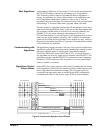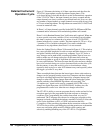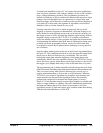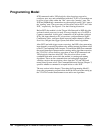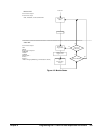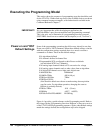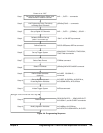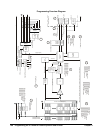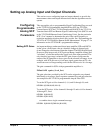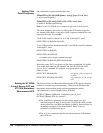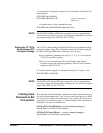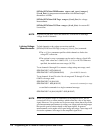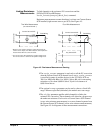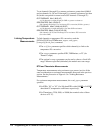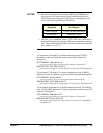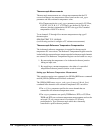
Programming the VT1422A for Data Acquisition and Control 107Chapter 4
Setting up Analog Input and Output Channels
This section covers configuring input and output channels to provide the
measurement values and output characteristics that the algorithms need to
operate.
Configuring
Programmable
Analog SCP
Parameters
This step applies only to programmable Signal Conditioning Plug-ons such
as the VT1503A Programmable Amplifier/Filter SCP, the VT1505A
Current Source SCP, the VT1510A Sample and Hold SCP, the VT1511A
Transient Strain SCP and Remote Signal Conditioning Units (RSCUs such
as the VT1529A/B Remote Strain Conditioning Units). See the particular
SCP’s User’s manual to determine the gain, filter cutoff frequency or
excitation amplitude selections that it may provide. See “Programming the
VT1422A & VT1529A/B for Remote Strain Measurement” on page 57. for
information on the VT1529A/B’s programmable settings.
Setting SCP Gains An important thing to understand about input amplifier SCPs and RSCUs
is that, given a fixed input value at a channel, changes in channel gain
do not change the value returned from that channel. The DSP (Digital Signal
Processor) chip keeps track of SCP gain and Range Amplifier settings and
"calculates" a value that reflects the signal level at the input terminal. The
only time this in not true is when the SCP gain chosen would cause the
output of the SCP amplifier to be too great for the selected A/D range. As an
example, with SCP gain set to 64, an input signal greater than ±0.25 volts
would cause an over-range reading even with the A/D set to its 16 volt range.
The gain command for SCPs with programmable amplifiers is:
INPut:GAIN <gain>,(@<ch_list>)
The gain selections provided by the SCP can be assigned to any channel
individually or in groups. Send a separate command for each gain selection.
An example for the VT1503A programmable Amp & Filter SCP:
To set the SCP gain to 8 for channels 0, 4, 6, and 10 through 19, send:
INP:GAIN 8,(@100,104,106,110:119)
To set the SCP gain to 16 for channels 0 through 15 and to 64 for channels
16 through 23, send:
INP:GAIN 16,(@100:115)
INP:GAIN 64,(@116:123)
or combine into a single command message:
INP:GAIN 16,(@100:115);GAIN 64,(@116:123)



